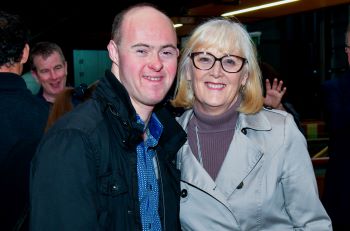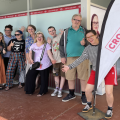Young adults living with Down syndrome have high aspirations and a great zest for life according to an Australian first study by researchers from The University of Queensland.
A team led by Associate Professor Rhonda Faragher and Dr Janette Lloyd from UQ’s School of Education conducted interviews and focus groups around the country, exploring the quality of life of Gen Z’s with Down syndrome.
“UQ’s Down Syndrome Research Program has been going for 40 years and we were curious about what life was like for those just finishing school and how their lives might be different to previous generations,” Dr Faragher said.
“We had a sense that new technologies, inclusive schooling and community engagement would have had an impact on the experiences of the new generation of young adults.”
Four research assistants – all with Down syndrome – were employed by UQ to conduct interviews and focus groups around the country.
“They were invaluable because they helped us see things in a different way, like choosing words and pictures to make the information more easily understood by the study participants,” Dr Faragher said.
“We were learning as much from them as they were from us!”

The team interviewed 26 people aged between 18 to 30, to gather data to inform national and international policy and practice.
“In Australia, families are routinely given false and outdated information about Down syndrome,” Professor Faragher said.
“This has implications for decisions parents are asked to make in a range of contexts like prenatal testing, education and health care.”
The study found that rather than a poor quality of life, Gen Z respondents had big hopes and dreams for jobs and hobbies, as well as joy and satisfaction in their relationships with family and friends.
“They’re engaged with technology in really quite clever ways, even people who had limited communication were using their devices to find things that interested them online, as well as text and FaceTime,” Dr Faragher said.
The study also found the participants were highly aware of their limitations and disliked being treated differently.
Dr Faragher said young people with Down syndrome expect to be treated with respect and dignity, but the study findings suggest low expectations and perceptions of incompetence persist.
“One participant said police officers approached her after a sporting event to ask if she was OK when she was just booking herself an Uber,” she said.
“Although the police had good intentions, they could have simply asked if she’d enjoyed the match to find out if she was OK without singling her out.”
The research, Stepping out in the world: the new adulthood for Gen Zs with Down syndrome, was funded by the National Disability Research Partnership (NDRP) hosted by the University of Melbourne and funded by the Department of Social Services.
Above left: Gen Z program participant Callum Scanlon and his mother Margaret Scanlon. Image: Supplied.
Media: Professor Rhonda Faragher, r.faragher@uq.edu.au, UQ Faculty of Humanities and Social Science, Kristen Johnston, k.johnston@uq.edu.au, +61 407 656 518; UQ Communications, communications@uq.edu.au, +61 429 056139.
.jpg)










